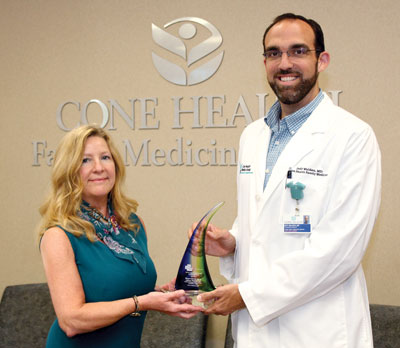PLEASE NOTE: Greensboro AHEC is now known as Piedmont AHEC. The organization’s name changed on February 1, 2023.
National AHEC Organization Recognizes Greensboro AHEC with Andy Nichols Award for Social Justice

WASHINGTON, D.C. — The Andy Nichols Award for Social Justice is provided in honor of Andrew W. Nichols, MD, MPH. He was a visionary who lived a life of service in pursuit of justice and health for all, and, most specifically, for the disadvantaged. Dr. Nichols established and directed Arizona’s statewide system of Area Health Education Centers, the State Office of Rural Health, and the Arizona Health Education Training Center(HETC) program. Dr. Nichols was also a driving force in the National AHEC Program, was a tireless advocate for our programs before Congress. The award is given to an individual, a specific project, or an organization in the AHEC network that exemplifies Dr. Nichols' vision and persistent service in pursuit of social justice. The award was presented to Shawn Houck, RN, MSN, and Jeffrey Walden, MD, of Greensboro AHEC in July at the 2018 NAO Biennial Conference in Washington, D.C.
Brief overview: Guilford Refugee Health Coalition Development Project
This project was the creation of the Guilford Refugee Health Coalition developed by Shawn Houck, MSN, RN, and Jeffrey Walden, MD, of Greensboro AHEC, which comprises eight community agency partners, including the Cone Health Congregational Nursing Program, the University of North Carolina at Greensboro Center for New North Carolinians, Church World Service and African Service Coalition (two local refugee resettlement agencies), Cone Health Center for Children, the Cone Health Office of Inclusion and the Cone Health Family Medicine Refugee Clinic. North Carolina has historically been, and remains, one of the top ten states in the country for resettled refugees, and Guilford County receives the second-highest number of refugees in the state, at around 1,000 persons in 2016. This target population often includes individuals with compromised health status who require advanced support measures to effectively navigate cultural and linguistic barriers in a vastly different healthcare system.
While refugees are generally eligible for more benefits than other groups of immigrants, they face more acute barriers to healthcare, including language, literacy, and cultural differences. The pilot project is in Swahili, and the toolkit will be translated in future languages most commonly cared for in the community. As the first project of this coalition, a refugee health literacy toolkit/navigation directory has been created to help newly-arrived refugees in Greensboro navigate a new healthcare system. Establishing a health presence can lead refugees to become productive U.S. citizens with earlier work development status for sustainable community settlement. This toolkit serves as an integration piece across agencies for communication and patient support needs, while also facilitating useful community healthcare information to the refugee community target population.
Get Social With @GreensboroAHEC!
Are you a student or healthcare professional who represents or serves a particular N.C. community? What does the future of health care look like to you? Let us know by posting your message to Instagram, Facebook, or LinkedIn using the hashtag #HealthCareerPathway and tag us @GreensboroAHEC. Thank you for reading, and thank you for supporting Greensboro AHEC!
